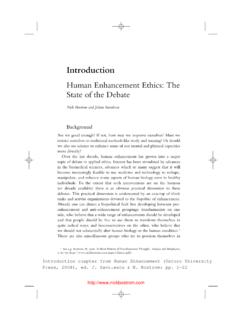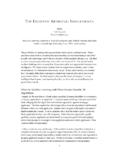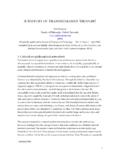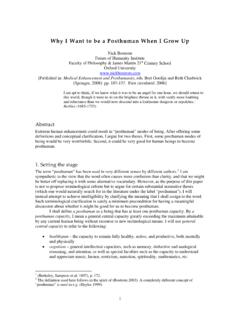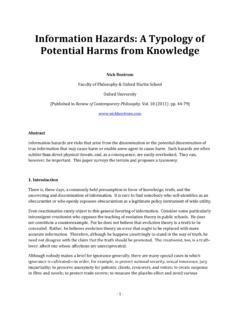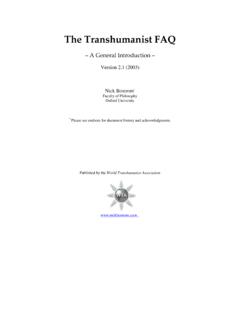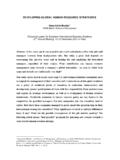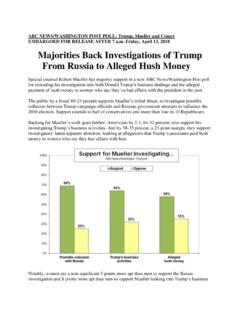Transcription of Future Progress in Artificial Intelligence: A Survey of ...
1 M ller, Vincent C. and Bostrom, Nick (forthcoming 2014), Future Progress in artifi-cial intelligence: A Survey of Expert Opinion, in Vincent C. M ller (ed.), Fundamental Issues of Artificial Intelligence (Synthese Library; Berlin: Springer). Future Progress in Artificial Intelligence: A Survey of Expert Opinion Vincent C. M ller a,b & Nick Bostrom a a) Future of Humanity Institute, Department of Philosophy & Oxford Martin School, University of Oxford. b)Anatolia College/ACT, Thessaloniki Abstract: There is, in some quarters, concern about high level machine intelligence and superintelligent AI coming up in a few decades, bring-ing with it significant risks for humanity.
2 In other quarters, these issues are ignored or considered science fiction. We wanted to clarify what the distribution of opinions actually is, what probability the best experts currently assign to high level machine intelligence coming up within a particular time frame, which risks they see with that development, and how fast they see these developing. We thus designed a brief question-naire and distributed it to four groups of experts in 2012/2013. The median estimate of respondents was for a one in two chance that high-level machine intelligence will be developed around 2040-2050, rising to a nine in ten chance by 2075.
3 Experts expect that systems will move on to superintelligence in less than 30 years thereafter. They estimate the chance is about one in three that this development turns out to be bad or extremely bad for humanity. 1. Introduction Artificial Intelligence began with the .. conjecture that every aspect of learning or any other feature of intelligence can in principle be so precisely described that a ma-chine can be made to simulate it. (McCarthy, Minsky, Rochester, & Shannon, 1955, p. 1) and moved swiftly from this vision to grand promises for general human-level AI within a few decades.
4 This vision of general AI has now become merely a long-term guiding idea for most current AI research, which focuses on specific scientific and en-gineering problems and maintains a distance to the cognitive sciences. A small minori-ty believe the moment has come to pursue general AI directly as a technical aim with the traditional methods these typically use the label Artificial general intelligence (AGI) (see Adams et al., 2012). If general AI were to be achieved, this might also lead to superintelligence: We can tentatively define a superintelligence as any intellect that greatly exceeds the cognitive per-formance of humans in virtually all domains of interest.
5 (Bostrom, 2014 ch. 2). One idea how Future Progress in Artificial Intelligence: A Poll Among Experts 2/19 superintelligence might come about is that if we humans could create Artificial general intelligent ability at a roughly human level, then this creation could, in turn, create yet higher intelligence, which could, in turn, create yet higher intelligence, and so on .. So we might generate a growth well beyond human ability and perhaps even an ac-celerating rate of growth: an intelligence explosion . Two main questions about this development are when to expect it, if at all (see Bostrom, 2006; Hubert L.)
6 Dreyfus, 2012; Kurzweil, 2005) and what the impact of it would be, in particular which risks it might entail, possibly up to a level of existential risk for humanity (see Bostrom, 2013; M ller, 2014a). As Hawking et al. say Success in creating AI would be the biggest event in human history. Unfortunately, it might also be the last, unless we learn how to avoid the risks. (Hawking, Russell, Tegmark, & Wilczek, 2014; cf. Price, 2013). So, we decided to ask the experts what they predict the Future holds knowing that predictions on the Future of AI are often not too accurate (see Armstrong, Sotala, & O Heigeartaigh, 2014) and tend to cluster around in 25 years or so , no matter at what point in time one 2.
7 Questionnaire Respondents The questionnaire was carried out online by invitation to particular individuals from four different groups for a total of ca. 550 participants (see Appendix 2). Each of the participants got an email with a unique link to our site to fill in an online form (see Appendix 1). If they did not respond within 10 days, a reminder was sent, and another 10 days later, with the note that this is the last reminder. In the case of EETN (see below) we could not obtain the individual email addresses and thus sent the request and reminders to the members mailing list.
8 Responses were made on a single web page with one submit button that only allowed submissions through these unique links, thus making non invited responses extremely unlikely. The groups we asked were: 1. PT AI: Participants of the conference on Philosophy and Theory of AI , Thessaloniki October 2011, organized by one of us (see M ller, 2012, 2013). Participants were asked in November 2012, over a year after the event. The total of 88 participants include a workshop on The Web and Philoso-phy (ca. 15 people), from which a number of non respondents came.
9 A list of participants is on: participants 1 There is a collection of predictions on Future Progress in Artificial Intelligence: A Poll Among Experts 3/19 2. AGI: Participants of the conferences of Artificial General Intelligence (AGI 12) and Impacts and Risks of Artificial General Intelligence (AGI Impacts 2012), both Oxford December 2012. We organized AGI Impacts (see M ller, 2014b) and hosted AGI 12. The poll was announced at the meeting of 111 participants (of which 7 only for AGI Impacts) and carried out ca.
10 10 days later. The conference site is at: 3. EETN: Members of the Greek Association for Artificial Intelligence (EETN), a professional organization of Greek published researchers in the field, in April 2013. Ca. 250 members. The request was sent to the mailing list. The site of EETN: 4. TOP100: The 100 Top authors in Artificial intelligence by citation in all years according to Microsoft Academic Search ( ) in May 2013. We reduced the list to living authors, added as many as necessary to get back to 100, searched for professional e mails on the web and sent notices to these.
